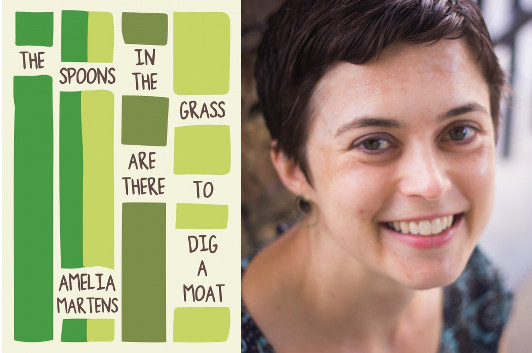Amelia Martens & the Year of the Snake

photo: Emily Margaret Okerson
Each of the poems in Amelia Martens‘s The Spoons in the Grass are There to Dig a Moat is a surreal scene, just a paragraph in length. (Well, okay, some of them are a few paragraphs, but let’s not quibble). A poem like “We Will Be Long Gone” unfolds with the logic of the answers to a child’s persistent bedtime questions, while others, like “Collection” or “Tuesday,” place Jesus in the midst of unsettling but largely recognizable tableaux—in the case of the haunting “Newtown,” all too recognizable. In this guest essay, Martens reveals a key influence on the dream-like specificity of her vivid imagery.
As an extremely near-sighted person, I have a history of up close experiences with the visual. Literally. Without my glasses, no one has a face. As a kid I read at night without my glasses and the pages brushed my cheek. I have also found it necessary to visualize—what I’d like to have happen in a given situation, what might happen, how a machine (or IKEA bookshelf) is put together, how much of everything I own will fit into a U-Haul so that I can drive it from California to Indiana. I’m a nearly blind visual person. Perhaps this is the reason imagery is a vital concern. Words make pictures; the right words make readers not notice the picture being made; instead we are sucked into the feeling. The visual becomes visceral.
In my second semester of the IU MFA program, in our poetry workshop, Maura Stanton assigned several collections that we were to read. Lee Ann Roripaugh’s Year of the Snake, which had recently been published by Southern Illinois University Press with a glossy half tattoo/half black cover, had my attention immediately, as I had acquired a new tattoo just weeks before leaving the west coast. Visually, this was not a book of poems written by a dead white man. And I am a monkey. Okay. We were born in the year of the monkey. Monkey twins with parents who incorporated cosmology into our upbringing. All of this to say, Roripaugh’s book had me at the outset.
I read these poems as a newly minted poet; somehow being in a poetry program made me “official.” I read them as a woman who had just moved from the Pacific Ocean to the Midwest. I had never been as weird as I was when I arrived in Indiana. People talked about California as if I’d come from Mars. What’s it like there? Do you surf? In Roripaugh’s poems I found encouragement, for my strangeness. And delight in the line as an image splitting tool.
“Octopus in the Freezer”
…By what unlikelihood
were you frozen solid in this tightly-wound
pose, like a multi-limbed Hindu goddess
in lotus position, riding the plains by freight
truck to Sakura Square in Denver…How odd, I keep thinking to myself
as everything around me creaks and groans
and shivers, then stills to ice and frost.
How odd that it has all come to this…In Roripaugh’s poems I found validation. Although it took me nearly another decade to fully believe that the personal can be universal, that the domestic is poetry worthy, and that large/important ideas can be stated in straight forward language, I can trace these discoveries back to Year of the Snake.
I’ve just written a book based in domestic experiences, the space where the personal domestic collides with the national domestic, and I can see Roripaugh’s fingerprints on poems in The Spoons in the Grass are There to Dig a Moat. Often in Year of the Snake, Roripaugh writes of being a kid, about her parents, but also about the larger contexts in which people live. These poems didn’t want to fight me; they wanted to give me small presents—spaces where I could reflect.
“Innocence”
My parents wrapped on old sheet
around the playpen to shield me
from the television, but I learned
to pull up the edge and peer out
from underneath to see newsreels
from Vietnam. I remember stretchers…In Roripaugh’s poems I learned that poems could have plants (“Love Potion”), animals (“Hope”), fears (“DDT”), and mythologies all their own (“Girl with a Bowl on Her Head”). They could be bold prints or delicately made. I learned it’s okay to be strange, even to my mother:
“I don’t know how
you turned out this way, she always
tells me and I think we are each
her own moon…”I also came to visualize a path—Roripaugh was from the west, she too had been in these rooms, in this very same MFA program, and she was out there writing (and, now, is the poet laureate of South Dakota). Thus, I see from here that after reading this book, I too
“grew a new, tough tongue,
and finally set myself free.”
11 April 2016 | poets on poets |

 Our Endless and Proper Work is my new book with Belt Publishing about starting (and sticking to) a productive writing practice.
Our Endless and Proper Work is my new book with Belt Publishing about starting (and sticking to) a productive writing practice. 
